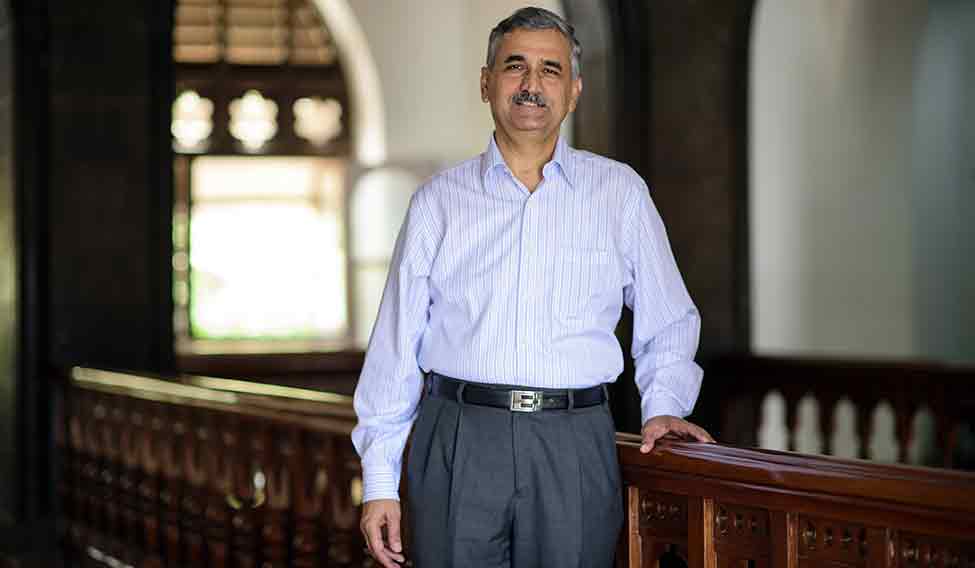Paul Verlaine, Stéphane Mallarmé and Arthur Rimbaud hold him in thrall. He says the 19th century French poets help him relax and read between the lines—in life and in his profession. Meet Dattatray ‘Datta’ Padsalgikar, Mumbai’s new police commissioner. The 40th commissioner of the force, Padsalgikar will remain in service until August 2018.
Belonging to the 1982 batch of the Indian Police Service, Padsalgikar’s longest stint was with the Intelligence Bureau—22 years. And, suddenly, he has been thrust under the spotlight. But, his work in the shadows means that he knows India’s most attacked city like the back of his hand, across jurisdictions. He is no stranger to regular policing. He has done his tour in the districts and was deputy commissioner in Mumbai from 1995 to 1998.
He headed the bureau’s probe into the 2006 train blasts in Mumbai, and says his men “were up to speed with the investigations and handled their job professionally and soundly”. And, what does he think of his new post? “We are going through difficult times and we need to be equal to those who criminally challenge us,” he said.
As commissioner, he brings to the table his wealth of experience from overseas stints. In 1993, Padsalgikar took a degree from the International Institute for Public Administration in Paris. After the course, he was attached to the French National Police for three months. “The stint with the French police honed my perceptions and shaped me as a senior officer,” said Padsalgikar.
From 2010 to 2014, he was attached to the embassy in Washington, DC, as minister (personnel and community affairs). His responsibilities included liaison with US departments of homeland security and justice. “It was an enjoyable assignment,” he said. “But, life in America is different. I am happy to be back home.”
Interestingly, his French connection began long before 1993. In a contrast of sorts, he earned an MA in French literature after a BA in English literature from Fergusson College, Pune. “I go back to the 19th century French poets as often as I can. I love and admire their oeuvre. Their writings have shaped my being and have coloured the way I look at human affairs and decide about them,” Padsalgikar said. And, his admiration is not restricted to poets. Novelists get it, too. Everyone from the Marquis de Sade to Guy de Maupassant and Emile Zola.
A lover of Maharashtrian food and music, Padsalgikar has the perfect half in Aditee, a professor of French at the University of Mumbai. Their son, Ashwin, is doing his postdoctoral research in mechanical engineering in the US and daughter, Shruti, is a lawyer.
“He is a calm and composed guy who prefers making his first tea in the morning,” said Aditee. The Padsalgikars prefer Darjeeling, black and unsweetened. “He prefers not to talk about work at home, but I step in when I feel he is troubled,” she continued. “There has always been an element of mutuality in our life. He helped me make notes and prepare lessons when I used to teach French in Mumbai initially, and then in Delhi, when he was posted there.”
Padsalgikar’s appointment came at a time when convicted terrorist David Coleman Headley was testifying in a Mumbai court and Islamic State was snaring Indians in the city. “It is the depth of our preparedness that worries me the most at this stage,” he said. “We should be able to calibrate our response capabilities against extremists and transnational criminals. It is the larger mosaic—how many tiny different parts make up the larger whole—that matters. When it comes to the regular and the not-so-regular policing, you cannot afford to miss the woods for the trees.”
About policing the internet and old-fashioned policing, Padsalgikar said, “Cyber-policing is critical given the inherent hurdles of monitoring cyberspace. But, the best intelligence is available at police station level. Which is why I accord it top priority and we are working to a well-chalked-out plan. Every police station will have an intelligence gathering unit. The officers manning these units would focus solely on intelligence work.”
Padsalgikar’s motto is that “policing is not what you do to people, but with the people”. On March 30, he tweeted from @CPMumbaiPolice: “My on-ground team is 50K+ & my online team is now 100K+. You have doubled our strength! @MumbaiPolice #ThankYou.” The occasion was the Mumbai Police’s handle, @MumbaiPolice, crossing 1 lakh followers. While going to press, @CPMumbaiPolice had 64,425 followers and @MumbaiPolice 1,13,170.
He said the force needed to command respect from the people. “Mumbai cops should be professional and citizen-friendly at the same time. The public should have faith in, and respect for, the men in khaki. And, if this happens with the men on the ground, it works wonders.”
Colleagues say Padsalgikar holds dear the cause of his men. In 1987, as superintendent of police in Osmanabad district, he ensured disbursal of pension to widows of policemen killed in Operation Polo, the “police action” which annexed Hyderabad in 1947. “I inquired with the accountant general’s office and they said that no records or data were available, based on which pensions and other benefits could be disbursed,” he said. “However, I persisted and ensured that pensions were awarded against collateral evidence. And, then I discovered a man in his 70s [who had worked with the martyred policemen]. He testified, and the widows got their pension and arrears.”
Official sources say Padsalgikar is a favourite of Chief Minister Devendra Fadnavis and National Security Adviser Ajit Doval. But, the man himself does not want to talk about it. These things do not matter, he said. Then, what does? He said, “[The satisfaction that comes from] doing justice to the country’s national security imperatives.... That is what matters.”












